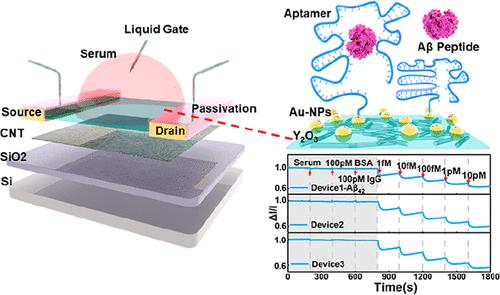Our official English website, www.x-mol.net, welcomes your feedback! (Note: you will need to create a separate account there.)
Aptamer-Functionalized Carbon Nanotube Field-Effect Transistor Biosensors for Alzheimer’s Disease Serum Biomarker Detection
ACS Sensors ( IF 8.9 ) Pub Date : 2022-07-11 , DOI: 10.1021/acssensors.2c00967 Hong Chen 1 , Mengmeng Xiao 2, 3 , Jianping He 1 , Yang Zhang 1 , Yuqi Liang 2 , Haiyang Liu 2 , Zhiyong Zhang 1, 2, 3
ACS Sensors ( IF 8.9 ) Pub Date : 2022-07-11 , DOI: 10.1021/acssensors.2c00967 Hong Chen 1 , Mengmeng Xiao 2, 3 , Jianping He 1 , Yang Zhang 1 , Yuqi Liang 2 , Haiyang Liu 2 , Zhiyong Zhang 1, 2, 3
Affiliation

|
Blood-biomarker-based tests are highly important for the early clinical diagnosis of Alzheimer’s disease (AD) and the treatment and care of AD patients, but the complex serum environment and extremely low abundance of AD blood protein biomarkers present challenges. Nanomaterials are promising for constructing highly sensitive transistor-based biosensors due to their small size. However, such biosensors are difficult to fabricate on a large scale and suffer from the lack of combined optimization of reproducibility and sensitivity in complex physiological fluids. In this work, field-effect transistor (FET) biosensors based on highly uniform semiconducting carbon nanotube (CNT) thin films are mass produced to achieve highly sensitive and selective detection of the AD core blood biomarkers of β-amyloid (Aβ). The combination of the mass-produced CNT FET sensors and oligonucleotide aptamers as efficient bioreceptors enables reliable and reproducible sub-femtomolar detection in full human serum for Aβ42 and Aβ40 peptides and has outperformed other methods reported to date. The adsorption of biological substrates to the sensor was significantly reduced by multiple blocking steps, resulting in selectivity ratios of up to 730% (Aβ40) and 800% (Aβ42). The aptamer-functionalized CNT FET biosensor exhibits a large dynamic range (>104), rapid response time (several minutes), and low variation (<10%) and can be delivered as a low-cost and rapid clinical detection technology for the early diagnosis and mass screening of AD. This platform will help bring complex laboratory-based and expensive diagnostic tools to the point of care.
中文翻译:

适用于阿尔茨海默病血清生物标志物检测的适体功能化碳纳米管场效应晶体管生物传感器
基于血液生物标志物的检测对于阿尔茨海默病 (AD) 的早期临床诊断和 AD 患者的治疗和护理非常重要,但复杂的血清环境和极低丰度的 AD 血液蛋白生物标志物带来了挑战。纳米材料由于尺寸小而有望用于构建基于晶体管的高灵敏度生物传感器。然而,这种生物传感器难以大规模制造,并且缺乏对复杂生理流体的重现性和灵敏度的综合优化。在这项工作中,大规模生产了基于高度均匀的半导体碳纳米管 (CNT) 薄膜的场效应晶体管 (FET) 生物传感器,以实现对 β-淀粉样蛋白 (Aβ) 的 AD 核心血液生物标志物的高灵敏度和选择性检测。42和 Aβ 40肽,并优于迄今为止报道的其他方法。多个封闭步骤显着降低了生物底物对传感器的吸附,导致高达 730% (Aβ 40 ) 和 800% (Aβ 42 ) 的选择性比。适体功能化的 CNT FET 生物传感器具有大动态范围(>10 4)、快速响应时间(几分钟)和低变化(<10%),可作为低成本和快速临床检测技术交付给AD的早期诊断和大规模筛查。该平台将有助于将基于实验室的复杂且昂贵的诊断工具带到护理点。
更新日期:2022-07-11
中文翻译:

适用于阿尔茨海默病血清生物标志物检测的适体功能化碳纳米管场效应晶体管生物传感器
基于血液生物标志物的检测对于阿尔茨海默病 (AD) 的早期临床诊断和 AD 患者的治疗和护理非常重要,但复杂的血清环境和极低丰度的 AD 血液蛋白生物标志物带来了挑战。纳米材料由于尺寸小而有望用于构建基于晶体管的高灵敏度生物传感器。然而,这种生物传感器难以大规模制造,并且缺乏对复杂生理流体的重现性和灵敏度的综合优化。在这项工作中,大规模生产了基于高度均匀的半导体碳纳米管 (CNT) 薄膜的场效应晶体管 (FET) 生物传感器,以实现对 β-淀粉样蛋白 (Aβ) 的 AD 核心血液生物标志物的高灵敏度和选择性检测。42和 Aβ 40肽,并优于迄今为止报道的其他方法。多个封闭步骤显着降低了生物底物对传感器的吸附,导致高达 730% (Aβ 40 ) 和 800% (Aβ 42 ) 的选择性比。适体功能化的 CNT FET 生物传感器具有大动态范围(>10 4)、快速响应时间(几分钟)和低变化(<10%),可作为低成本和快速临床检测技术交付给AD的早期诊断和大规模筛查。该平台将有助于将基于实验室的复杂且昂贵的诊断工具带到护理点。


























 京公网安备 11010802027423号
京公网安备 11010802027423号